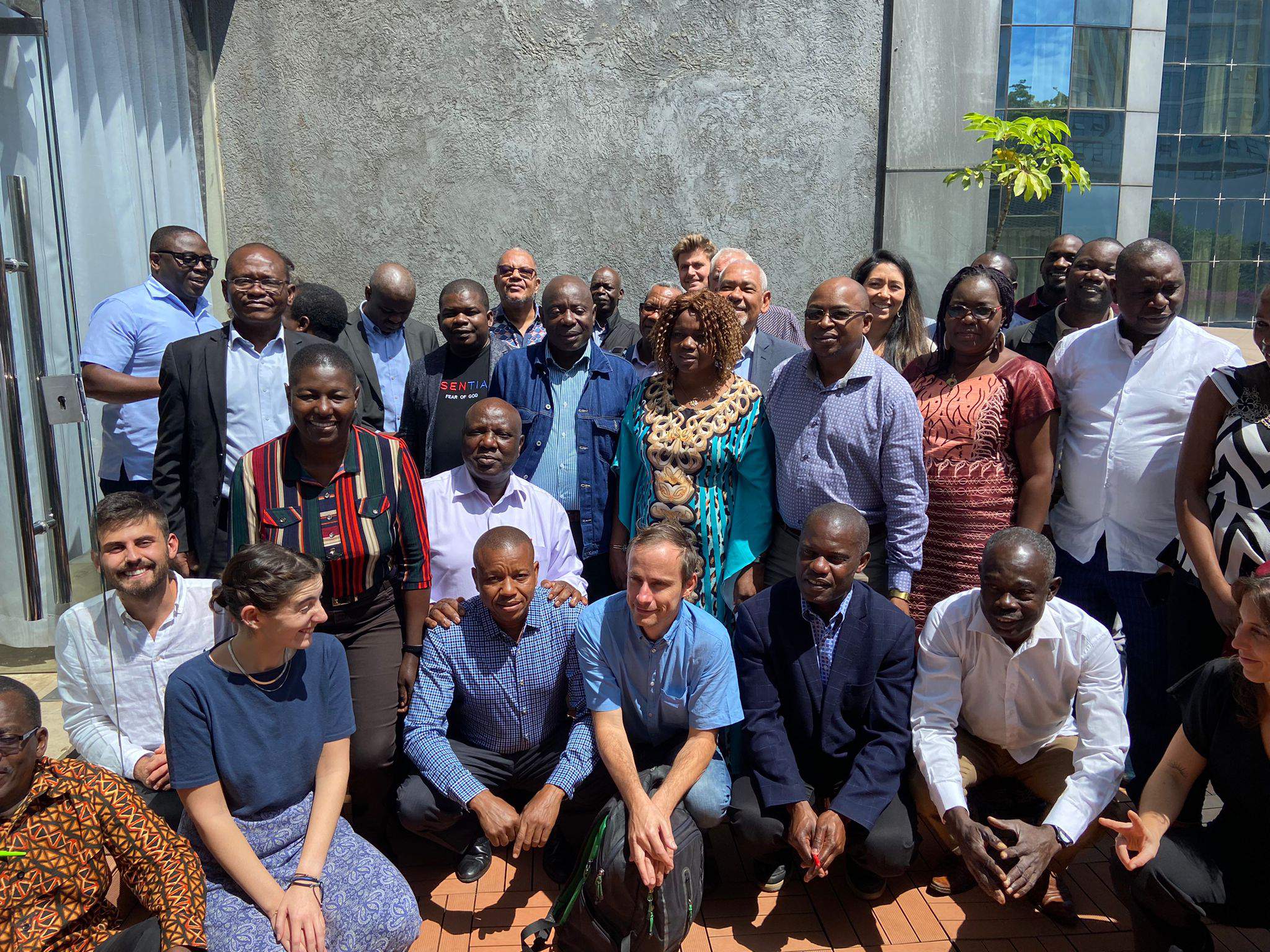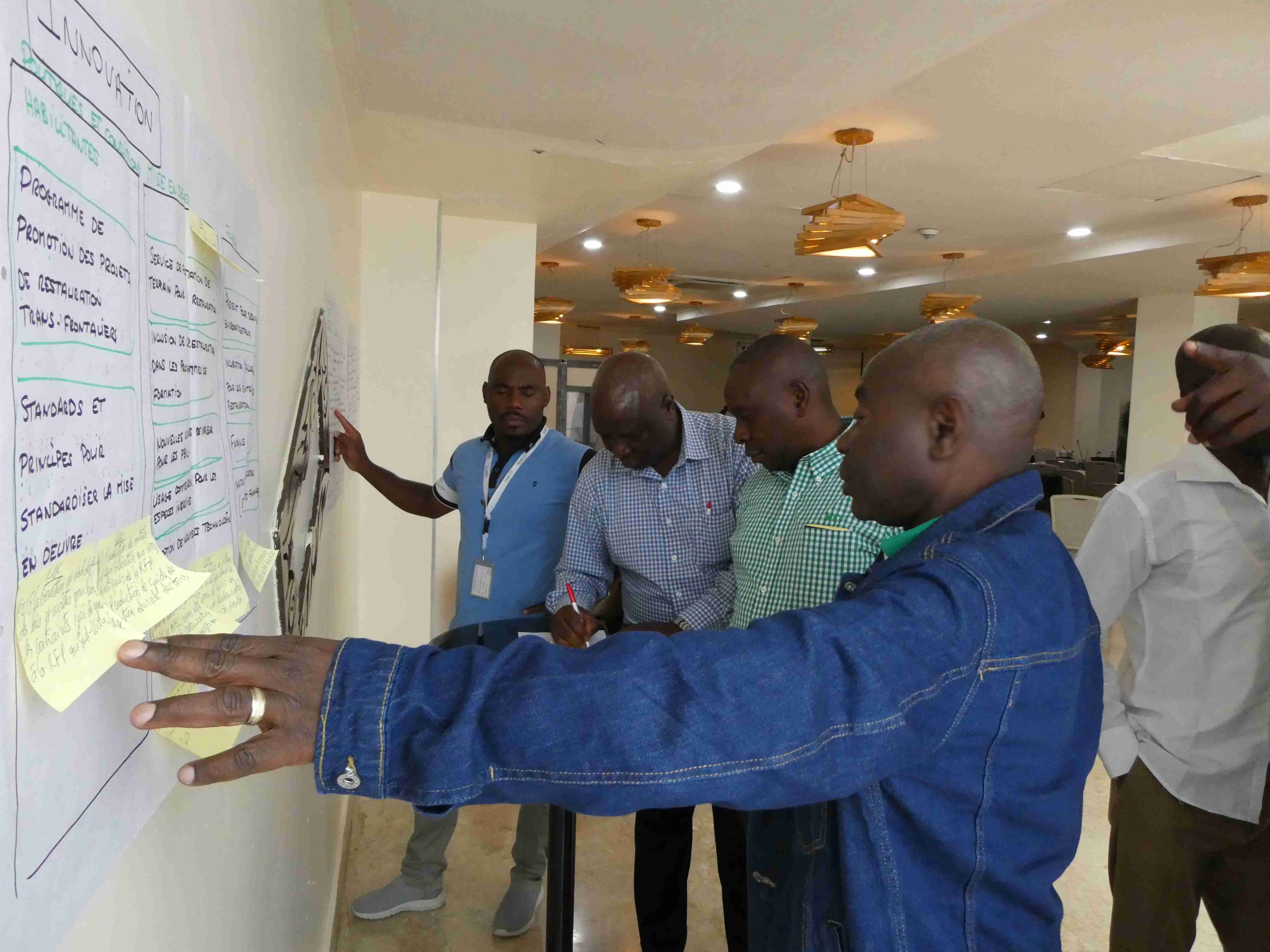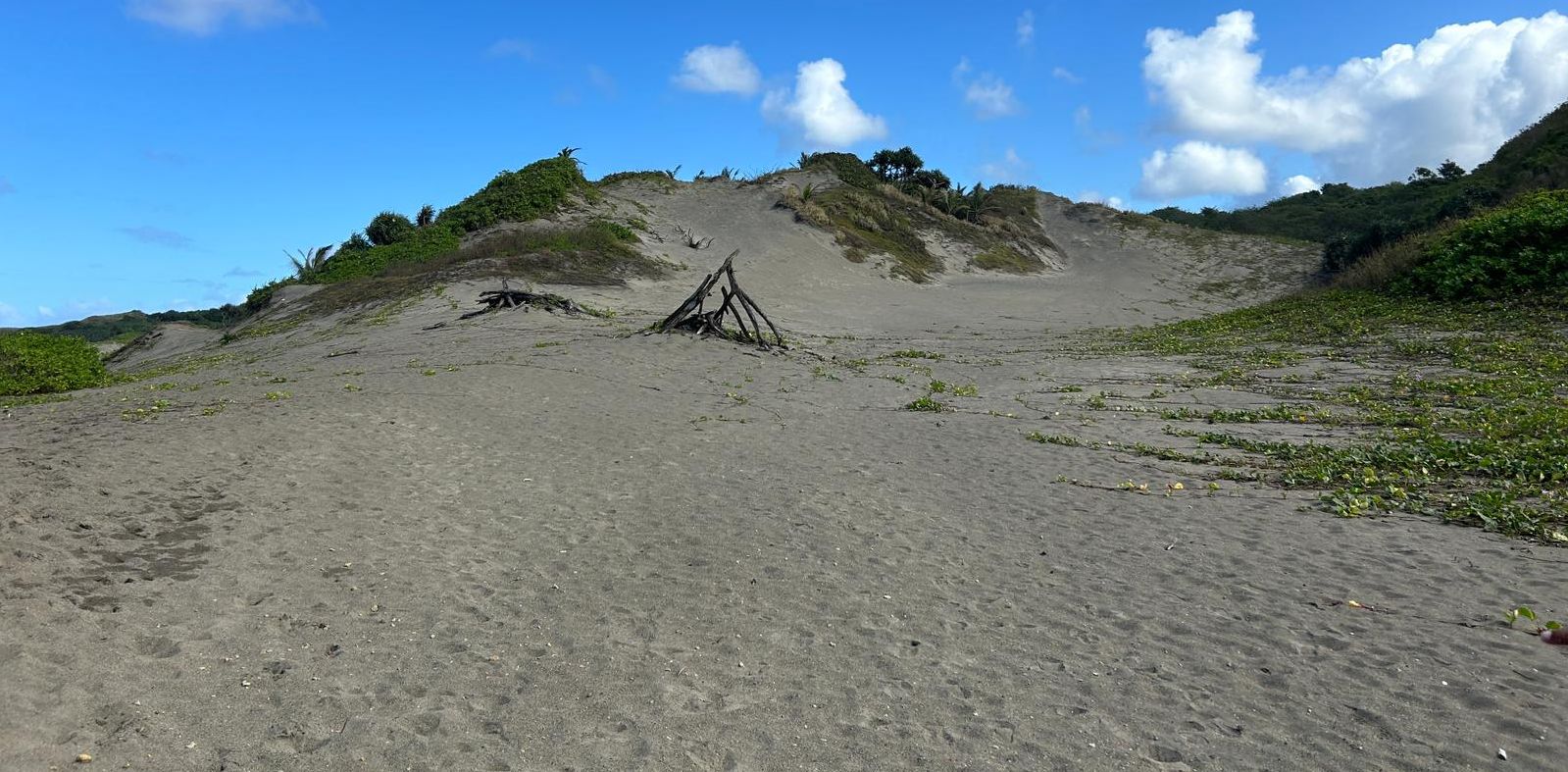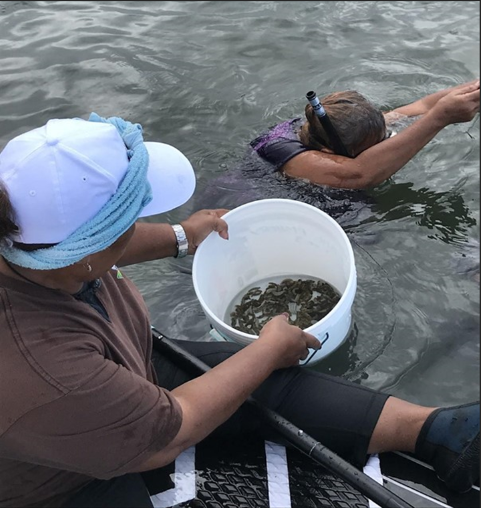New strides for collaboration and synergies for the TRI community
The Restoration Initiative (TRI) programme implementers and project teams gathered for the first in-person summit since 2019, focused on adaptive management and finance.
The COVID-19 pandemic created a set of unique challenges and opportunities for global organizations – such as TRI programme implementers, IUCN, FAO and UNEP – which had to switch to virtual and remote workplaces, and for the larger TRI community who were unable to meet in person at annual global learning workshops. While the virtual meetings and webinars held in 2020 and 2021 were successful in keeping country teams connected and planning for a successful upcoming year, for the first time in two years, the 2022 workshop hosted in person in Kenya was a welcome change. By gathering colleagues from eight countries, including implementing partners, this workshop not only provided a way to rekindle a sense of community, but also to identify collaboration opportunities and to plot the way forward, especially as related to adaptive management and finance.
In preparation for the event, countries were surveyed on their priorities for the in-person workshop. Teams expressed interest in more exchanges among countries to improve cross learning on topics of shared concern, including seedling selection, mangrove restoration and policy strategies. As such, the workshop was structured in a responsive manner, where partnership building, open discussions, networking and general enabling spaces were created and prioritized.
“TRI is an outstanding programme that brings together different perspectives, which is our greatest strength. ... [We must] keep working together to fight the immense land degradation problems we have ahead,” said Florian Reinhard, Programme Officer, Monitoring and Evaluation, IUCN.
Adaptive management has played an important role in TRI programmatic objectives and success. Adaptive management describes the structured and iterative process of decision making due to any level of uncertainty, ultimately with the goal of reducing future uncertainty. This approach includes monitoring of programmatic objectives and thereby allows for the “capacity to adapt restoration plans to emerging changes in stakeholders, ecosystem dynamics or intended results."
With an overall theme of and focus on adaptive management, this workshop provided space to identify each country’s major contributions to the broader TRI community. Such discussions from country partners were valuable for all participants and project colleagues, a few of which are highlighted below:
- In Cameroon, difficulties developing bankable projects arose due to lack of interest from private enterprises. This was addressed by initiating negotiations with the government to develop a project for grant support, which will capitalize on TRI achievements.
- The Guinea-Bissau project tapped into its nationally relevant expertise and partnered with two new villages to restore mangroves in their abandoned rice fields, after the original villages were no longer able to participate.
- In Pakistan, a forest management and utilization plan was prepared, which is fundamentally more adaptive than the regular forest and landscape restoration (FLR) management plan.
- Across all projects, the COVID-19 pandemic and related issues prevented several international consultations and travel, which was a crucial component of adaptive management discussions.
Adaptive management is critical in any initiative, as has continually been highlighted by several project partners. Such discussions during this workshop led to the creation of action plans to bring the in-person, lively discussions into reality, following the workshop conclusion. Framing this workshop as contributory, particularly as related to adaptive management, allowed for the entire cohort of participants to learn from one another and thereby easily share and grow their combined knowledge.
A central part of this workshop was focused on the identification of synergies and how to best achieve them in the context of the programme. One of the key added values of TRI lies in the integrated approach of the programme and the collaboration opportunities it offers by bringing together expertise in policy design, institutional capacity building and best practices, private sector engagement and finance mobilization. These approaches are coordinated across the programme’s nine countries while acknowledging the different countries’ unique sets of characteristics. Such collaboration between complementary programmes accentuates programmatic impact by working across the aforementioned sectors, in a coordinated way, rather than through individual or disconnected projects. Achieving such synergy requires colleagues across and between project teams to actively seek opportunities to work together, especially at country level.
 Global TRI partners gather for an in-person workshop in Kenya.
Photo: IUCN
Global TRI partners gather for an in-person workshop in Kenya.
Photo: IUCN
For instance, if the policy team of one country succeeds in improving the enabling regulatory environment for FLR interventions, it is critical that this is shared as an FLR best practice. The same goes for a country team who has successfully secured financial resources to ensure rapid uptake and upscale of such policy. During this workshop, countries discussed the best ways of leveraging opportunities for cross country and programmatic learning, which in turn will help other country teams to properly harness these learnings. Doing a mapping exercise of the synergies between the three global support components and aligning the groups targeted by each project were ways to enable the creation of a co-design space, where collaborative solutions were identified.
Countries established six priorities for collaboration: 1) policy support and enabling environment, 2) FLR technical support, 3) assisted natural regeneration, 4) communications, 5) monitoring, and 6)resource mobilization. A few examples of the many activities planned under these collaborative priorities include increasing seed and plant material diversity, improving policy engagement at several levels, hosting webinars and training workshops to facilitate knowledge sharing, exploring the use of protocols, elaborating on research effectiveness to show how projects are bankable, and overall creating collaborative work streams among specific child projects. Overall, these collaborative priorities all relate to the collection of best FLR practices and sharing through the United Nations Decade on Ecosystem Restoration.
“The TRI programme offers many opportunities for duplication and upscaling which can be of inspiration to other important global initiatives, such as the United Nations Decade on Ecosystem Restoration,” said Jonathan Gheyssens, Technical Lead, Finance Mobilization, UNEP.
Collaboration and partnerships were discussed at length, conducted through small breakout groups, creating a space for project partners to share ideas, successes and failures, to learn and – simultaneously – share their own learning. This collaborative environment encourages and begins the kindling of future partnerships across the restoration community.
There is no better space to share progress than a global workshop among colleagues and partners. The focus on adaptive management was paired well with a showcase of the progress already completed, including finance tools and concrete examples of how to work with entrepreneurs for restoration endeavours.
 TRI partners collaborating during an interactive workshop session.
Photo: IUCN
TRI partners collaborating during an interactive workshop session.
Photo: IUCN
Restoration is an approach that is fundamentally unique and applicable to a broad array of ecosystem types, in varying states and with a diverse set of stakeholder involvements. This was emphasized in the second part of the workshop, where attendees engaged with the Kenyan cohort of the TRI Restoration business incubation programme, the Restoration Factory. TRI participants visited one of the eco-entrepreneurs (ecopreneurs) to hear the challenges of building a restorative business, namely access to financing and markets. The next day, attendees participated in the pitch session when mentees of the factory programme presented their various sustainable enterprises.
“Very informative ... [to hear] how restoration can be a livelihood enhancement system. Financing of restorative approaches and businesses is key to achieving restoration engagements,” commented Elijah Mboko, Project Technical Assistant, FAO.
The “Pitch Parade” presentations formed part of the 6-month Restoration Factory incubation programme where the ecopreneurs worked through a step-by-step, mentor-guided process to develop their landscape restoration focused business models. Sixteen ecopreneurs presented their pitches in this session. A wide variety of restoration approaches and enterprises was showcased, reflecting the diversity of restoration projects. TRI participants were highly engaged and networked with the ecopreneurs of the factory programme to share useful insights and offer connections where possible. Through feedback forms, TRI participants provided feedback and their contacts to several of the mentees to help these ecopreneurs continue to build successful restoration businesses that provide positive impacts for the environment and their local communities.
“The actions of entrepreneurs are necessary and deserve to be initiated for and in other TRI countries,” said Nzale Sumaili, Project Coordinator, South Kivu, Ministry of Environment and Sustainable Development.
As evidenced thus far, the TRI programme has enabled successful restoration outcomes in several countries, and all are looking forward to what is next. As such, this workshop included consultations related to a no-cost extension for the programme, during which three areas were prioritized.
- Sharing best practices was emphasized throughout the workshop, by multiple countries in different sessions. This is a seamless fit with the priority workstream of cross-country exchange and the communication strategy.
- The country child projects expressed interest in continued technical support from the lead agencies. In providing details, country representatives communicated a desire to see continued support on communication strategies, cross-country exchanges and accessing finance for restoration.
- Given that various child projects have requested various extensions of their specific projects, country representatives emphasized the need for the global child project to bolster technical support and knowledge exchange. Such extensions range from ending in mid-2024 to extending until 2025 and 2026, which bodes well for the future of the TRI family of programmatic engagement.
While remote meetings and workshops certainly have their place – especially when considering the carbon footprint of transportation needed for a global meeting, heightened inclusivity and accessibility available for virtual options, and many other key considerations – the TRI workshop held in November 2022 in Kenya proved to be particularly successful because of the collaborative and networking components.
“We must see TRI as more than the sum of the different child projects and should thus put all of our resources together to create synergies and enhance collaborations between all the TRI countries,” said Adriana Vidal, TRI Project Manager and Climate Change Senior Policy Adviser, IUCN.
In reflecting upon successes and lessons learned, all participants – and those engaged in the broader TRI community – were able to look ahead to a bright restored future. This workshop provided a concrete opportunity to learn from different realities, contexts and progress on restoration across the TRI community.
This story is from TRI Year in Review 2022



